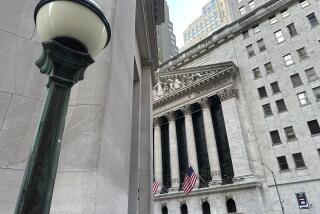Stocks Rebound After Weak Start
Stocks resurged Wednesday as buyers poured back into the market after Tuesday’s sell-off.
In the bond market, yields on Treasury issues dived to 40-year lows by midday, then sharply rebounded. Corporate junk bond yields, meanwhile, neared 10-year highs--a sign of investors’ continuing jitters about the economy.
It all made for another volatile day on Wall Street. And analysts warned to expect more of the same.
“This market is going to continue to test our patience,” said Philip Dow, director of equity strategy at brokerage RBC Dain Rauscher in Minneapolis. “One day it seems like the world is coming to an end, the next day we’re OK.”
The Dow Jones industrial average rallied 260.92 points, or 3.1%, to 8,743.31, and the tech-oriented Nasdaq composite surged 65.02 points, or 5.1%, to 1,334.30.
The Standard & Poor’s 500 jumped 4%.
All three major indexes notched their best gains since July 29, as winning stocks topped losers by 5 to 2 on the New York Stock Exchange and by 2 to 1 on Nasdaq.
Beaten-down technology, financial and retail stocks led the rally, and trading volume was active.
Dain Rauscher’s Dow said investors may have viewed Tuesday’s sell-off, which followed the Federal Reserve’s decision to leave its key interest rate unchanged, as unwarranted. “I think the market realizes rates are low enough,” Dow said. “There’s enough fuel already in place for an economic recovery.”
What’s more, the Fed said it is aware that the recovery has weakened in recent months, and indicated it could ease credit further in the fall if the economy appears to be sliding back into recession.
Reassuring news in the retail sector, where Nordstrom beat quarterly earnings estimates and Wal-Mart Stores boosted its share buyback program a day after its strong profit report, also gave stocks a lift, Dow said.
Nordstrom gained $1.21 to $18.44, and Wal-Mart leaped $3.91 to $52.62.
Stocks also may have benefited from relief that more earnings restatements did not precede the Securities and Exchange Commission’s deadline Wednesday for the heads of big firms to certify their financial results, analysts said.
A shift by institutional investors away from government bonds and into stocks added punch to the rally as well, after Treasury yields dived Tuesday as the Fed conceded the economy has slowed.
The 10-year T-note yield, which sank to a 40-year low of 4.09% Tuesday, briefly dropped below 4% Wednesday, which may have triggered so-called asset allocation trades out of bonds and into stocks by pension funds and other large players. The benchmark yield ended the day at 4.12%.
The two-year T-note yield rebounded to 2.15% on Wednesday from 1.97% on Tuesday.
For big investors, “almost all their models are saying it’s time to rebalance to equities,” Dow said, with the S&P; 500 down 20% year to date.
While investors have snapped up Treasury debt in the last week, however, they have continued dumping corporate bonds, especially junk issues. That reflects worries that the economy may continue to weaken, further hurting companies’ creditworthiness, analysts said.
“Creditworthiness is under siege sector by sector,” said Jerry Paul, a hedge fund manager at Quixote Capital Management in Denver. “Now it’s airlines, but we’ve seen it with energy, cable and just about everything else. It’s not just telecom anymore.”
The yield on KDP Investment Advisors’ index of 100 junk bonds climbed to 12.28% from 12.21% Tuesday, and is the highest since December 2000.
Access to capital is an increasing concern for corporate America, analysts say. “Investors are going to wait to see that [corporate] earnings really have turned around before they extend credit again,” said John Puchalla, economist at Moody’s Investors Service.
A spate of credit-rating downgrades is adding to the air of concern. Puchalla said there have been 14 “fallen angels”--companies downgraded from investment grade to “junk” status--so far in the third quarter, on pace to top the record 23 in the first quarter of 2001. Such downgrades make corporate borrowing far costlier.
Paul said extreme caution among bond investors, bankers and corporate leaders--who would rather pay down debt than borrow to expand their businesses--could spell trouble for the economy.
“I’m not in the ‘double dip’ recession camp, but the impact is going to be that economic growth is slower than expected,” he said. “Appropriate as well as inappropriate debt is being curtailed, which could have long-term effects.”
Market Roundup, C5-6
More to Read
Inside the business of entertainment
The Wide Shot brings you news, analysis and insights on everything from streaming wars to production — and what it all means for the future.
You may occasionally receive promotional content from the Los Angeles Times.










